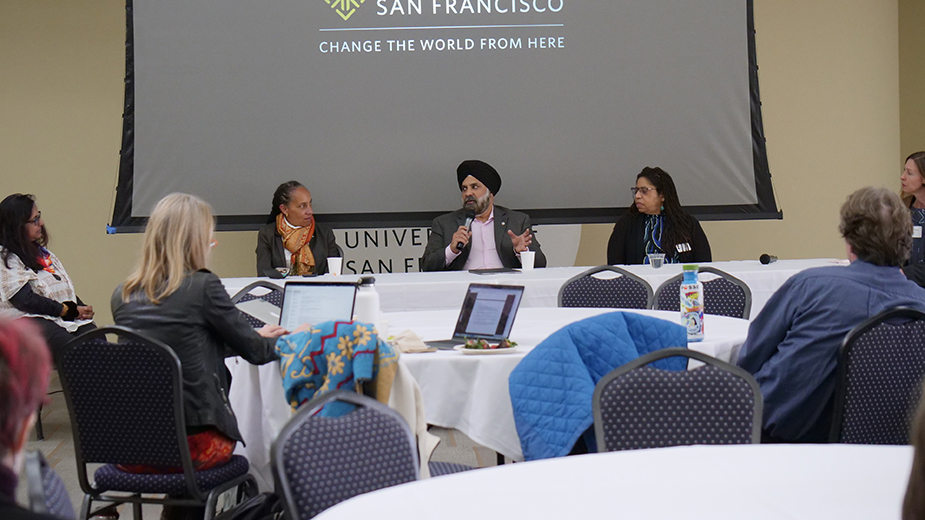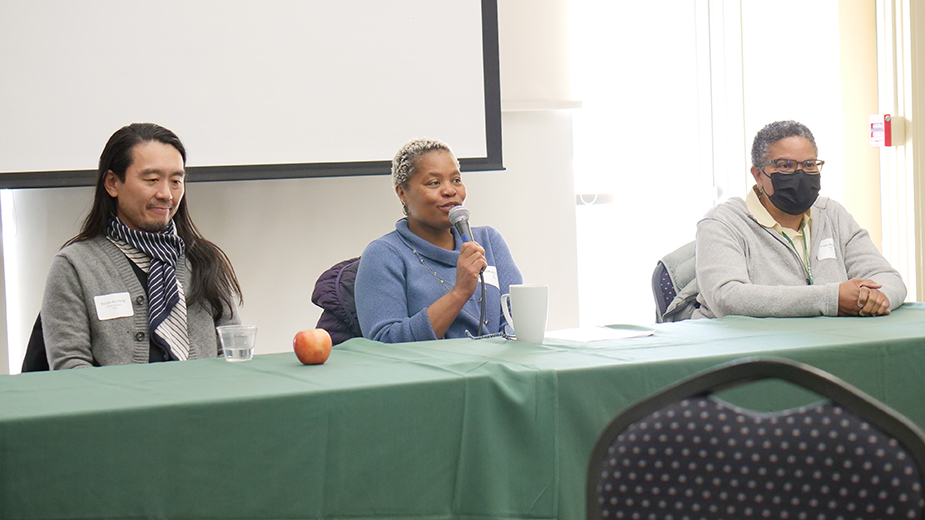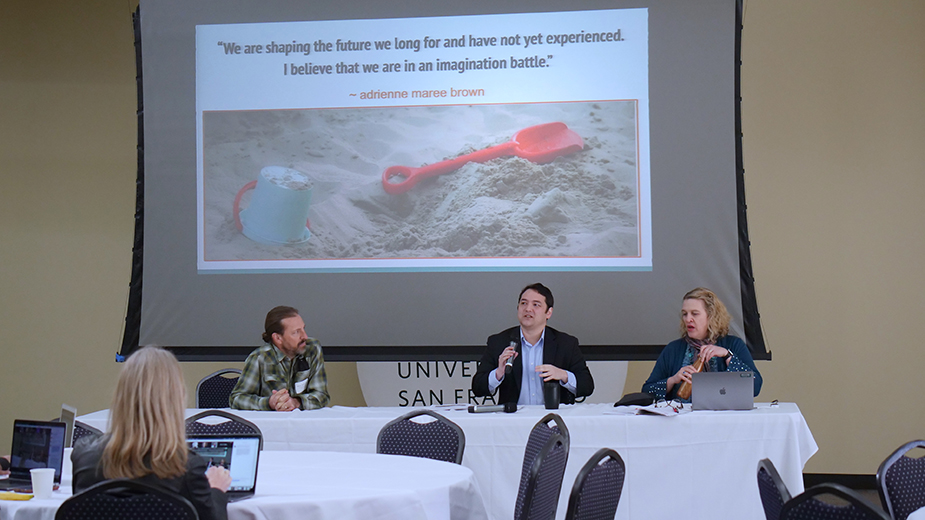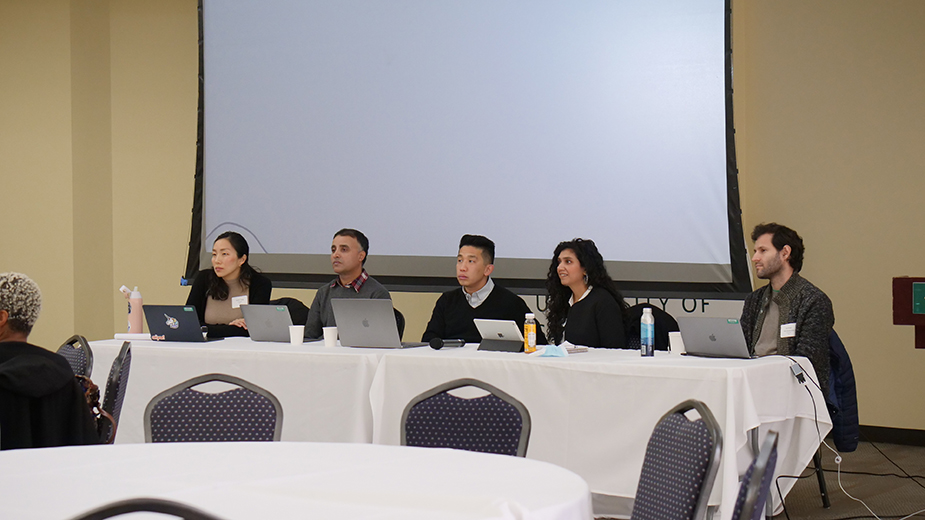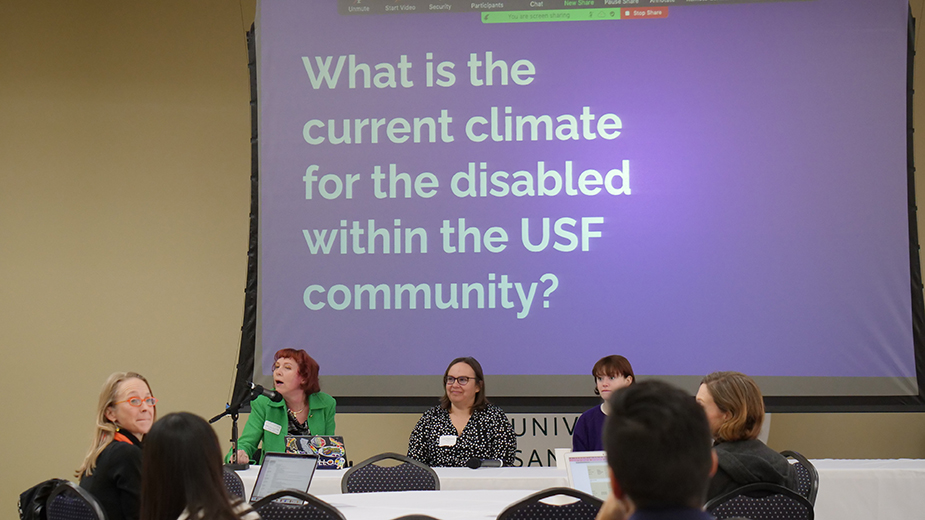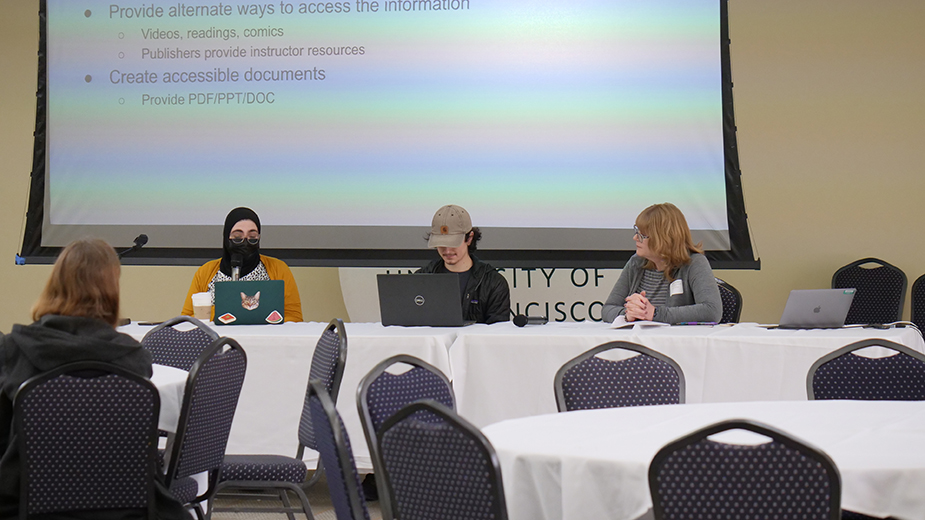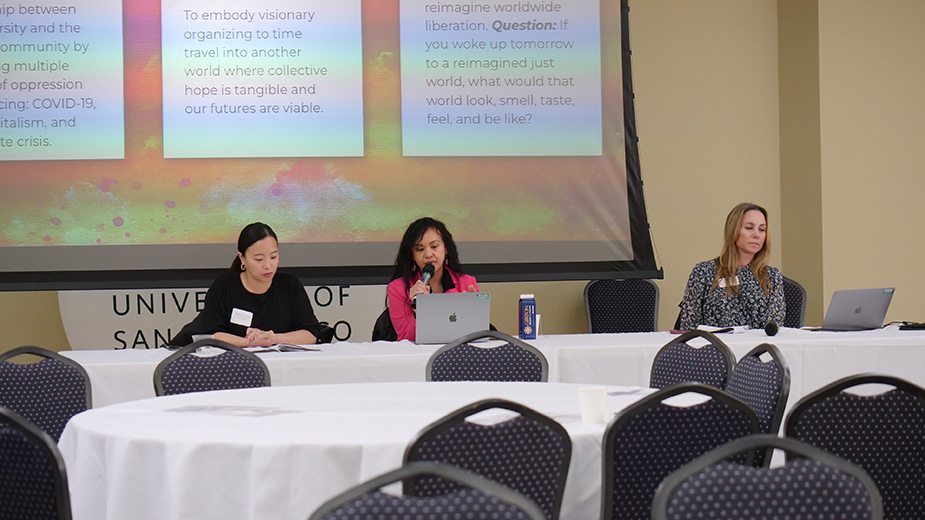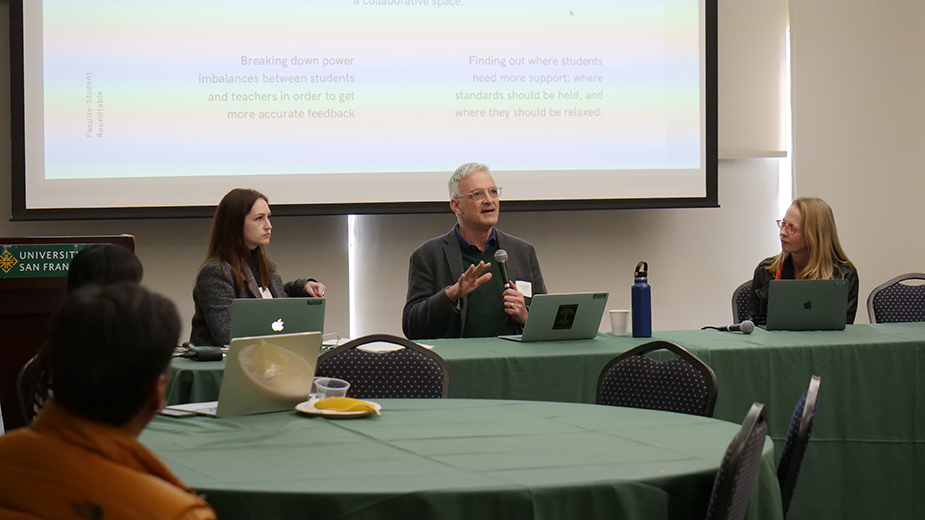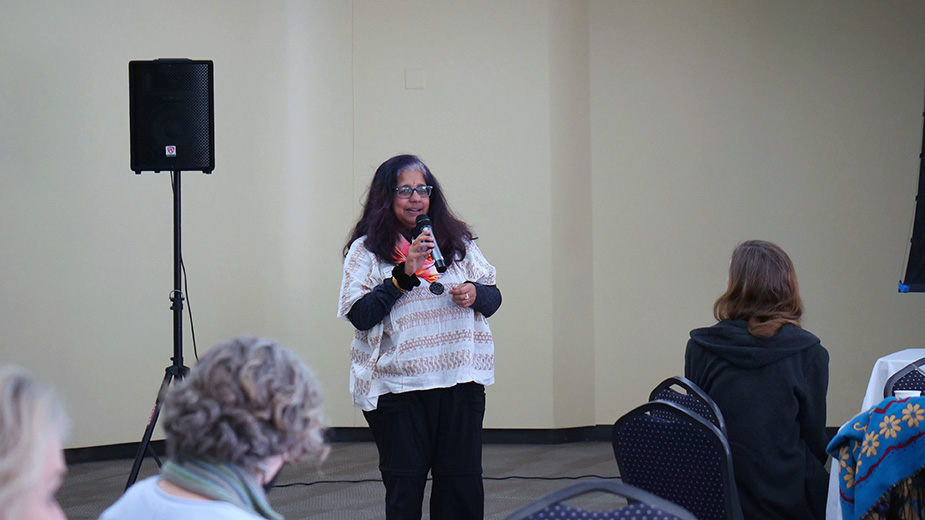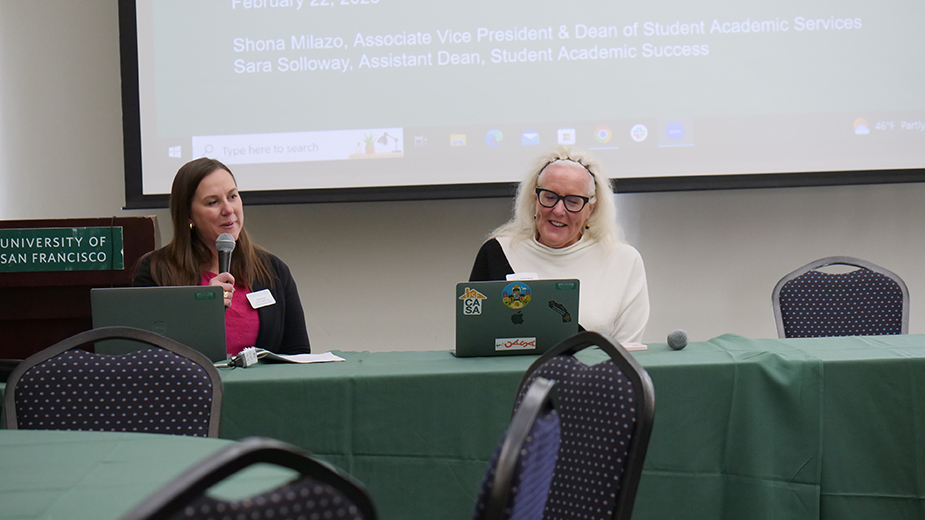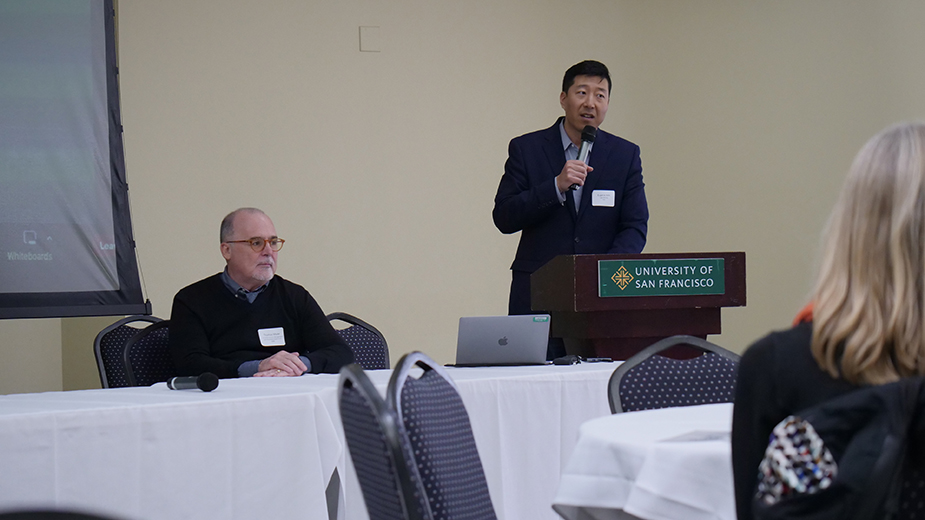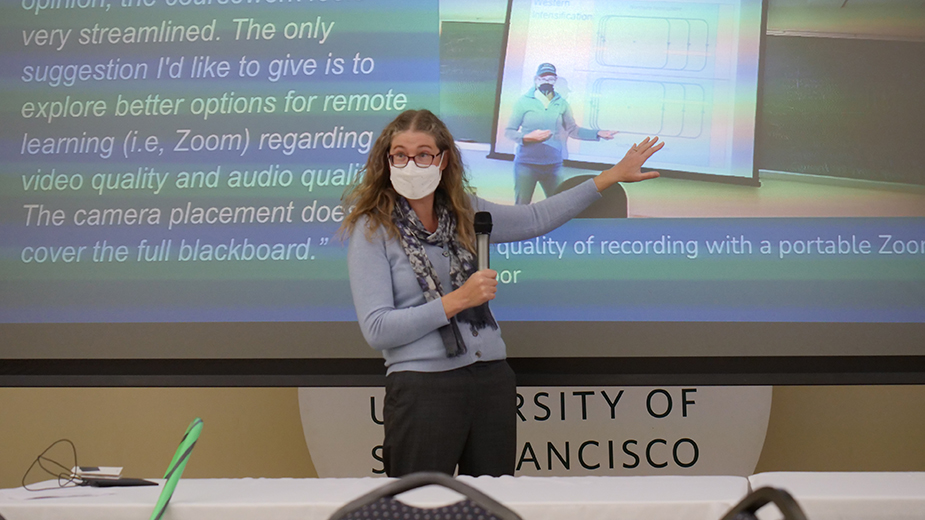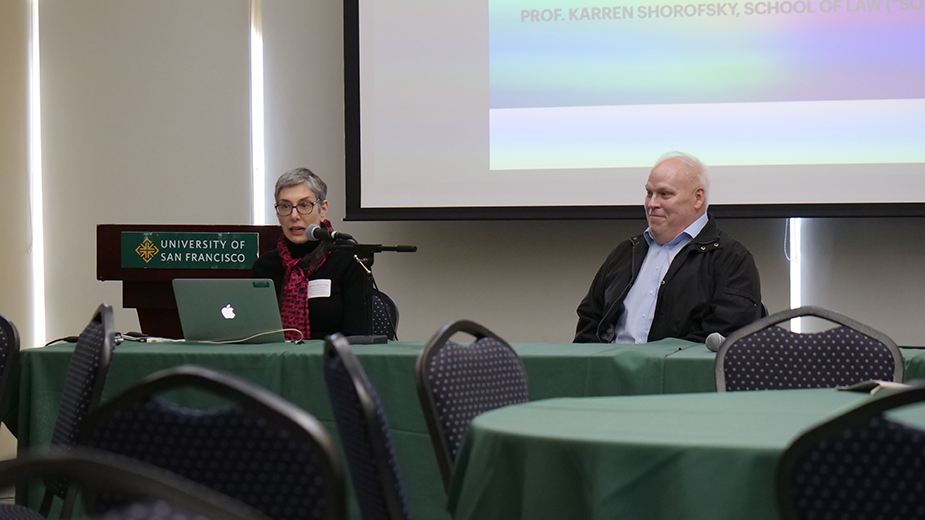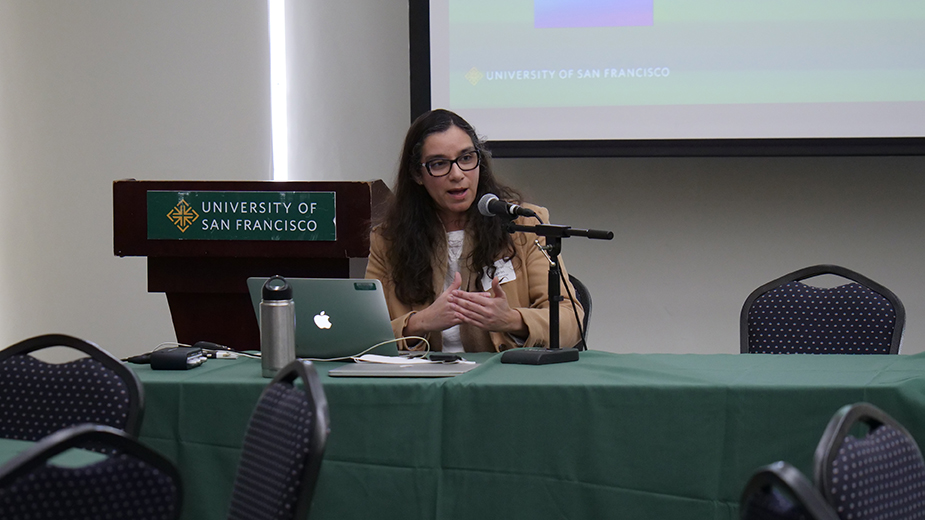CTE/ETS 3D Symposium: Discern, Dream, Design
Reimagining Jesuit Education @ USF
The aims of the 3D Symposium are to foster dialogue across areas and roles, build and strengthen our community, and revitalize our passion for teaching and learning. It will provide space to share key learnings from 2.5 years of remote, hybrid, hyflex and online teaching; we hope to glean ideas, insights, and recommendations that will help guide the implementation of our Strategic Plan, particularly our first goal to “Reimagine Jesuit Education.”
Feb. 22: Wednesday Sessions
| Sessions (40 minutes) | Title | Wednesday, February 22 | Day 1 | Presenters |
|---|---|---|---|
|
Session 1: 10-10:40 am (MCL 252) |
Welcome (Opening Remarks) Beyond the Syllabus: Systemic Changes for Decolonial Praxis |
In this roundtable, we invite colleagues to participate in a discussion about what it means to decolonize teaching and learning in higher education. We will draw on our experiences in our Faculty Learning Collective to center the conversation on issues that are particularly challenging to address in academic institutions. We hope to generate interest in this problem-set amongst our colleagues and to advance the conversation through the collective identification of our shared commitments in this area. | Kouslaa Kessler-Mata, Associate Professor, Political Science; Erin Brigham, Joan and Ralph Lane Center for Catholic Social Thought |
|
Session 2: 10:45-11:25 am (MCL 252) |
Lessons from the Sandbox: Insights into the Possibilities and Limitations of Unstructured Teaching | What if we dismantled our courses and classrooms and invited students into a sandbox where play, inquisitiveness and experimentation are the norm? Might this approach overcome the "right answer" thinking many students have adopted over the course of their education? What are the risks involved for faculty in this sandbox style of pedagogy? What are the potential benefits? And what are examples of a sandbox activity, assignment, or course? Faculty participating in the 2021-2022 Sandbox Pedagogy FLC will engage in conversation around these and other questions. | Steve Zavestoski, Professor, Environmental Studies, and faculty participants in the Sandbox Pedagogy FLC. Everett Monroe, School of Law and Management; and Christine Young, Performing Arts. |
|
Session 3: 11:30-12:10 pm (MCL 252) |
Community Conversation with Strategic Plan Working Group #1: Reimagining Jesuit Education | This community discussion is part of a series of planned conversations around the Strategic Plan organized by the working groups in conjunction with the Strategic Plan Advisory Council (SPAC) and the Provost's Office. The primary goal is to hear from as many folks as possible on the issue of what a reimagined Jesuit Education at USF could look like, and how existing Jesuit values and pedagogy could be incorporated in new, or already existing, curricular and co-curricular ways to help USF meet future challenges and evolving local and global contexts. We will collectively consider questions such as: What do you think needs to be “reimagined” in the USF curriculum? What do you think needs to be protected from change? What new or reimagined co-curricular programs do you think should be considered? How might we better integrate diversity, inclusion, and global initiatives into a USF Jesuit education and faculty and staff hiring? | Tri-Chairs of WG #1: Simon Flores, Associate Dean, Student Life; Joshua Gamson, Associate Dean, CAS; Kate Lusheck, Professor, Art + Architecture; Working Group #1; Chinyere Oparah, Provost |
| LUNCH: 12:10-12:50 pm | |||
|
Session 4: 12:50-1:30 pm (MCL 252) |
Administrative Leadership Panel: Looking Back, Looking Forward — Reflecting on Lessons Learned from Pandemic Teaching |
CIO Opinder Bawa, Provost Chinyere Oparah, Vice Provost Sheila Smith McCoy |
|
|
Session 5: 1:35-1:45 pm (MCL 252)
|
Centering Students and Media-making Solutions in Media Studies |
Problem: Description: Outline:
|
Dorothy Kidd, Professor, Media Studies and International Studies |
|
Session 5: 1:45-2:15 pm (MCL 252) |
From Internship to Partnership: A Critical Reflection on the |
Annie and Justine designed a semester-long research project A reciprocal teaching and learning approach was employed where the Scholar and supervising librarians shared guided critical reflection throughout the project to make meaning of the intersections among academic knowledge in adjacent fields, civic engagement, diversity, positionality, and power. The main goals of the program were to support the scholarship and interests of Presenters will include the Scholar and supervising librarians who will discuss the internship curriculum and design and its significant impact on the Scholar and Gleeson Library. |
Justine Withers, Electronic and Continuing Resources Catalog Librarian; Annie Reid, University Archivist; Zoe Hume, Ph.D. Student for Museum Education and Visitor-Centered Curation at Florida State University (via pre-recorded video) |
|
Session 5B: 1:35-2:15 pm (MCL 251) |
Leading Asynchronous Online Core Courses for Undergraduate Students |
In summer 2020, USF introduced its first set of fully online asynchronous courses as part of an initiative led by the Student Hybrid Experience (SHE) Advisory Board. The purpose of these courses was to create flexible and diverse course offerings for students and faculty, while expanding options for students looking to "stay on track" for 4-year graduation. Three years, 13 of these core courses are running each summer with another 10 planned for Summer 2023, and a recently survey of students participating in summer sessions suggested the asynchronous online courses were the preferred course type. |
Byron Au Yong, Associate Professor, Performing Arts; Stephanie Sears, Associate Professor, Sociology; Tracy Benning, Associate Professor, Environmental Science; Susan Zolezzi, Associate Director, Instructional Design, ETS |
|
Session 6: 2:20-3:00 pm (MCL 252) |
Integrating International Students' Voices into Conversations |
USF prides itself on international students. However, |
Kevin Lo, Professor, School of Management; Marcella DeProto, ISSS; |
|
Session 6B: 2:20-2:40 pm (MCL 251) |
Partnering with CASA to Support Undergraduate Academic Success/Retention |
This session hosted by the Center for Academic and Student Achievement (CASA) will review data collected from the New Student Success Survey and the Early Alert Program on post-pandemic trends pertaining to student belongingness, success, and retention. We will engage in conversation and idea sharing around student belongingness and fostering student success. |
Shona Milazo, Student Life; Sara Solloway, CASA |
|
Session 6B: 2:40-3:00 pm (MCL 251) |
Engaging in Community-Responsive Scholar-Activist Research & Students’ Sense of Belonging
|
I'd like to present my team's manuscript on the topic of belonging in the context of a community-based participatory research project that involved undergraduate and graduate students (half of which are first-generation), as well as members of a farmworker community in the Central Valley. My presentation will (a) explore the literature on students' sense of belonging in college, (b) describe our team's framework for affirming students' sense of belonging to strengthen retention and persistence, and (c) results of our retroactive student surveys. (d) I conclude with implications on scholar activist research and learning among undergraduates and grad students. | Dr. Alfonso A. Aranda, Gerardo Marín Fellow, Environmental Studies |
Feb. 23: Thursday Sessions
| Sessions (40 minutes) | Title | Thursday, February 23 | DAY 2 | Presenters |
|---|---|---|---|
|
Session 1: 10-10:40 am (MCL 252) |
Insights from 'Moment to Movement': Recommendations for Anti-Racist Pedagogies at USF |
College of Arts & Sciences faculty participants in the 2022-2023 “Moment to Movement” Anti-Racist Pedagogy Workshop Series
|
Aysha Hidayatullah, Associate Professor, Islamic Studies, Theology and Religious Studies; Sangman Kim,Assistant Professor, Biology; Tika Lamsal, Associate Professor, Rhetoric and Language; Joyce Yang, Assistant Professor, Psychology; Herman Nikolayevskiy, Assistant Professor, Chemistry |
|
Session 2: 10:45-11:25 am (MCL 252) |
Creating Campus Cultures to Foster Disability Inclusivity |
Learning Objectives By the end of the workshop, participants will:
|
Dr. Alette Coble-Temple, Associate Professor, PsyD, SONHP; Julia Thompson, Assistant Professor, Department of Engineering |
|
Session 3: 11:30-12:10 pm (MCL 252) |
Practical Strategies to Create Accessible and Inclusive Courses |
For our presentation, a panel of instructors from different fields from Arts & Sciences and a USF student will share examples and recommendations on how to make courses fully accessible to all learners, regardless of their physical and/or cognitive impairments. The panel participants will discuss the main principles of Universal Design for Learning/Instruction, explain their training and the steps they have taken to make their courses fully accessible and share student feedback and recommendations. Audience members will learn practical tips, as well as tailored ideas for their fields of study. |
Nour Al-muhtasib, Assistant Professor, Biology; Kendrick Lacerda, USF Philosophy major; Karyn Schell, Professor, Spanish Studies; with contributions from Leslie King, Instructor, Biology |
| LUNCH: 12:10-12:50 pm | |||
|
Session 4: 12:50-1:10 pm (MCL 252) |
Reimagining the Role of Grading in Jesuit Education |
The principles of Ignatian pedagogy include context, experience, reflection, action, and evaluation. The purpose of evaluation in the Ignatian paradigm is to produce an awareness of the real needs yet unmet, as well as to help learners understand their own personal, intellectual, and moral growth. In both Jesuit and non-Jesuit institutions, evaluation has traditionally been performed through grading. Indeed, grading is widely accepted as a fundamental requirement of the teaching and learning process. It is assumed that grading is necessary to motivate students; assess their learning; and ensure a meritocratic system in which everyone is given the same opportunity to succeed based on their own hard work, aptitude, and objective performance. But research shows grading to be ineffective and even counter-productive on every one of these fronts. So is grading really accomplishing its purpose in Jesuit education? |
Eugene Kim, Professor, School of Law |
|
Session 4: 1:10-1:30 pm (MCL 252) |
Universal Design Learning Assessment Techniques for Experiential Learning based Course Design | I'm experimenting with more inclusive and equitable grading methods based on Universal Design Learning theory. In particular, assessing synchronous and asynchronous class learning outcomes that are based on experiential learning-industry embedded projects. |
Thomas Maier, |
|
Session 5: 1:35-2:15 pm (MCL 252) |
Creating Community-Campus Spaces for Shared Imagining: Moving Toward Our Aspirations for Community Engagement as a Transformative Force |
To truly foster and sustain partnerships that advance the public good, we must look beyond discreet collaborative projects to co-create shared aspirations for what we can accomplish collectively as we build meaningful relationships. What benefits will our partnership yield for relevant constituencies over the long term? What are we trying to address or change, and what will we see when we’ve been successful? How are our collaborations embedded within existing movements for justice, sustainability, and liberation? What is the world we are trying to create through this partnership? These questions can’t be answered unilaterally by an individual or institution, but rather they must emerge from the collective imaginations of those co-laboring for equity and justice. They must be answered in the context of human relationships as well as institutional and systemic frameworks. Drawing on the scholarship of adrienne maree brown and Grace Lee Boggs, and inspired by Afrofuturist and intersectional feminist movements, we have developed a principle and praxis of shared imagining to inform community-campus partnership work. Specifically, we advocate for creating spaces and facilitating opportunities to dream, vision, and imagine together with faculty, students, and community partners. In our own work, shared imagining has been a north star for our recent community-driven collaborative mural project, community partner examen to guide revisions to the university’s mission statement, and a recent research study on feminist approaches to advancing higher education’s public purpose. This workshop will trace the roots and definition of shared imagining as a principle and praxis, offer examples of how it looks in action, and guide participants through infusing shared imagining into their own work. Learning Outcomes:
|
Star Plaxton-Moore, Director of Community-Engaged Learning; Angeline Vuong, Associate Director of Community Engagement and Public Service Programs; Jacqueline Ramos, Community-Engaged Learning Programs Manager |
|
Session 5B: 1:35-2:15 pm (MCL 251) |
Faculty-Student Roundtable |
The Faculty-Student Roundtable was a 2021 forum for faculty and students to reflect on emerging dynamics in the classroom and discuss shared questions and goals while facing an evolving learning landscape. Founded by International Studies student Jocelyn Lambert (class of 2021) and International Studies Department Chair John Zarobell, the Roundtable found a nurturing host in the Center for Teaching Excellence at USF. By seeking out the voices of a broadly representative group of faculty and students across schools and colleges, the Roundtable aimed to foster dialogue and deeper understanding across the university community. Conducted during the Spring 2021 semester, the Faculty-Student Roundtable emerged as a general assembly seeking to create a safe space to discuss a wide range of topics. Although navigating the challenges of the pandemic was top of mind during the remote semester, themes and discussions were much farther-reaching, and addressed broader educational perspectives. Goals for the Roundtable included: deconstruction and rebuilding of the educational model, increasing communication between communities, finding a platform for students (especially marginalized voices), breaking down power imbalances between students and teachers, and building a sense of a collaborative space. These 90-minute discussions were well-attended and thoughtful, with a variety of faculty and students from different departments. In summation, the spirit of the Faculty-Student Roundtable is the striving for classroom as a dialogue. Both the findings and implications from a semester of Roundtable discussions present compelling material for multiple categories in the 3D Symposium, including: humanizing teaching, new insights on teaching, and the future of teaching modalities at USF. Founders John Zarobell and Jocelyn Lambert (now a Program Assistant at USF) propose a 45-50 minute panel on the findings and impact of the Roundtable, as well as a possible future template for its renewal. While the students who participated have graduated, Jocelyn will attend as student organizer, John as faculty organizer, and we imagine Marilyn DeLaure who participated as CTE host but also as a faculty member. Roundtable Themes:
|
John Zarobell, Associate Professor, International Studies; Marilyn Delaure, Professor, Communication Studies; and Jocelyn Lambert, Computer Science |
|
Session 6: 2:20-3:00 pm (MCL 252) |
Hybrid and hyflex Teaching in the Sciences and Engineering | We would like to reflect on how remote learning has worked for those of us in the natural sciences. As scientists, many of us enjoy the "hands-on" components of our work, which were naturally a challenge for remote learning. We found that remote learning worked well for things like paper discussions, but was more challenging with other types of material. We would like to hear people's successes and the limitations. | Allison Luengen and Amalia Kokkinaki, Associate Professors, Environmental Sciences |
|
Session 6B: 2:20-2:35 pm (MCL 251)
|
Fostering Connection and Engagement in the Classroom through Google Worksheets | In this presentation I hope to share about how different online tools, provided by Google, helped me navigate online instruction during shelter in place. As we quickly had to transition to online teaching, graduate students reported missing classroom discussions, connection, and engagement. Taking their feedback (discern), I gradually began to incorporate problem-based learning to ensure collaboration in the remote space (design). As we transitioned to in-person instruction again, I found myself bringing the same Google in-person tools into the in-person classroom. In dreaming about the future, I wonder about my own learning and the continued use of technology to promote connection/engagement, universal design for learning, and content accessibility for all students. |
Leyla Perez-Gualdron, Associate Professor, School of Education |
|
Session 6B: 2:35-2:50 pm (MCL 251) |
Innovation in Teaching with Technology |
ITS's Innovation in Teaching with Technology program recognizes faculty who are finding new ways to use technology in education. These awards honor faculty who have demonstrated innovative uses of technology in education to improve student learning. John Bansavich with provide an overview of the program and Karren Shorofsky will share her approach to Teaching using a HyFlex modality. Karren was able to support both students who are physically present in the classroom or Zooming in a way that engages everyone more effectively and completely than it might be thought possible. Karren was inventive in her use of multimedia techniques, incorporating video that is directly related to the subject matter before class, in a sort of "pre-game" show, which puts students in the mindset of learning. She uses music with visual aids that reference the subject matter and provides a historical basis for key concepts. |
John Bansavich, ETS and Computer Science; Karren Shorofsky, School of Law |
|
Session 6B: 2:50-3:00 pm (MCL 251) |
Adaptation of Remote Teaching Technology to In-Person Teaching |
Techniques used during teaching via Zoom turned out to be too useful to discard when returning to in-classroom teaching. |
Diane Hume, Adjunct Faculty, Computer Science |
